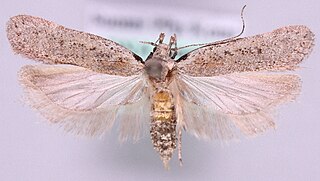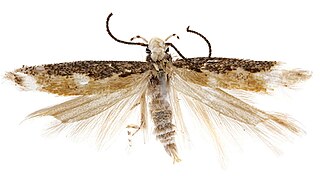
The Lecithoceridae, or long-horned moths, are a family of small moths described by Simon Le Marchand in 1947. Although lecithocerids are found throughout the world, the great majority are found in the Indomalayan realm and the southern part of the Palaearctic realm.

Aristotelia is a genus of moths in the family Gelechiidae. Well-known species are food plant specialists, and diverse hosts are used – Salicaceae, Solanaceae, Rosaceae, Fagaceae, Fabaceae, Asteraceae.

Dichomeris is a genus of moths in the family Gelechiidae erected by Jacob Hübner in 1818.

Gelechia is a genus of moths in the family Gelechiidae. The type species is Gelechia rhombella.

Helcystogramma is a genus of moths in the family Gelechiidae. The genus was erected by Philipp Christoph Zeller in 1877.

Hypatima is a genus of the twirler moth family (Gelechiidae). Among these, it belongs to a distinct lineage, which is variously treated as tribe Chelariini in subfamilies Dichomeridinae, Gelechiinae, or even Pexicopiinae, and historically was considered a subfamily in its own right, Chelariinae. Of this lineage, Hypatima – under its junior synonym Chelaria – is the type genus. This genus has numerous species, but its exact limits are not quite clear. This genus occurs mainly in the Southern Hemisphere, though one of the better-known species is the only member of this genus native to Europe, the lobster-clawed moth.

Glyphidocera is a genus of moths in the family Autostichidae.

Thiotricha is a genus of moths in the family Gelechiidae, subfamily Thiotrichinae.
Untomia is a genus of moths in the family Gelechiidae.

Eudonia is a large and widespread genus in the grass moth family (Crambidae), subfamily Scopariinae. There is no common name for the roughly 250 species placed here; new species are still being described regularly. Although the genus was proposed early in the 19th century, many of these moths were for a long time retained in Scoparia, the type genus of the subfamily and a close relative of Eudonia. A few small genera have been proposed for separation from Eudonia, but given the size of this group this is not particularly convincing; thus, all are retained here pending a comprehensive phylogenetic review.

Crocanthes is a genus of moths in the family Lecithoceridae.

Lecithocera is a genus of moths in the lecithocerid subfamily Lecithocerinae. The genus was erected by Gottlieb August Wilhelm Herrich-Schäffer in 1853.
Asymphorodes is a gelechioid moth genus in subfamily Agonoxeninae of the palm moth family (Agonoxenidae), whose taxonomic status is disputed. Alternatively, the palm moths might be a subfamily of the grass-miner moth family (Elachistidae), with the Agonoxeninae becoming a tribe Agonoxenini.

Gelechiinae is a subfamily of moths in the family Gelechiidae. It was described by Henry Tibbats Stainton in 1854.

Anacampsinae is a subfamily of moths in the family Gelechiidae.
Apatetrinae is a subfamily of moths in the family Gelechiidae. The subfamily was described by Edward Meyrick in 1947.
Untomia acicularis is a moth of the family Gelechiidae. It was described by Edward Meyrick in 1918. It is found in Ecuador.
Untomia melanobathra is a moth of the family Gelechiidae. It was described by Edward Meyrick in 1918. It is found in Ecuador.
Chlamydastis is a genus of moths in the subfamily Stenomatinae.










